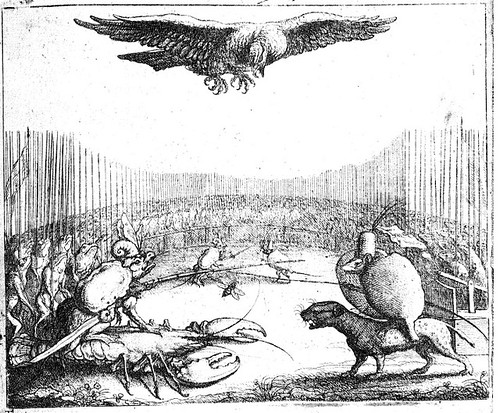HODIE: ante diem tertium Idus Martias. The Ides of March are fast approaching!
GOOGLE BOOKS: Today's Google Books are the seven volumes of the Thesaurus Patrum Floresque Doctorum.
MYTHS & LEGENDS: The art image for today's legend shows Heracles and Alcestis ; you can also see the legends for the current week listed together here.

TODAY'S DISTICHS & EMBLEMS: All the distichs come with vocabulary lists!
RHYMING DISTICHS: The two new Rhyming Distichs are Discere si quaeris, Discere si quaeris, doceas: sic ipse doceris, / Et studio tali tibi proderis atque sodali; and Damna Dierum, Damna fleo rerum, sed plus fleo damna dierum; / Quisque potest rebus succurrere, nemo diebus (this one has a slideshow, too!).
CATO'S DISTICHS: The two new Cato Distichs are Sermones blandos, Sermones blandos blandosque cavere memento: / Simplicitas veri forma est, laus ficta loquentis; and Productus testis, Productus testis, salvo tamen ante pudore, / Quantumcumque potes, celato crimen amici.
MARTIAL'S DISTICHS: The two new Martial Distichs are Iliaco similem, Iliaco similem puerum, Faustine, ministro / lusca Lycoris amat. Quam bene lusca videt! and Invitas centum, Invitas centum quadrantibus et bene cenas; / Ut cenem invitor, Sexte, an ut invideam?
OWEN'S DISTICHS: The two new Owen epigrams, with Harvey's English versions, are De Prodigo et Avaro, Prodigus omnis homo miser est, miser omnis avarus, / Istius miseri filius ille miser; and Respice Finem, Omega distinguit misero non alpha beatum; / Ante obitum felix nemo, nec ante miser.
CAMERARIUS'S EMBLEMS: The two new emblems are Currenti Cede Furori, Quis furor est caeco temere se offerre furori? / Cede, parum exspecta - nec mora, victor eris; and Ne Moveas, Ad tua cur taceam dicteria foeda requiris? / Non anagyrin ego, spurce, movere volo.
ROLLENHAGEN'S EMBLEMS: The two new emblems are Amor Docet Musicam, Oblectant animos cytharae, cantusque, lyraeque; / Musica blandus amor plectra movere docet; and Non Te Sed Nummos, Non te, sed nummos, turpissima bestia sponsus, / Crede mihi, qui te tum bene tractat, amat.

TODAY'S MOTTOES & PROVERBS:
TINY MOTTOES: Today's tiny motto is: Firmus maneo (English: I remain steadfast).
3-WORD PROVERBS: Today's 3-word verb-less proverb is In medio tutissimus (English: Going the middle way, safest)
AUDIO PROVERBS: Today's audio Latin proverb is Nocumentum documentum (English: A loss, a lesson). To read a brief essay about this proverb and to listen to the audio, visit the Latin Via Proverbs blog.
PUBLILIUS SYRUS: Today's proverb from Publilius Syrus is: Amico firmo nil emi melius potest (English: There is nothing you can buy that is better than a firm friend).
ERASMUS' ANIMALS: Today's animal proverb from Erasmus is Camelus vel scabiosa complurium asinorum gestat onera (English: Even a mangy camel can bear the loads of many donkeys; from Adagia 1.9.58).
TODAY'S FABLES & STORIES:
ANECDOTE OF THE DAY: Today's anecdote is Virgines Sabinae, the story of the early Romans and how they seized the Sabine women.
FABULAE FACILES WIDGET: The fable from the Fabulae Faciles widget is Canes et Agricola Penuria Laborans, a story about dogs who know how to get out while the getting is good (this fable has a vocabulary list).
MILLE FABULAE: The "chunk" of Mille Fabulae et Una today is Fable 571, Anser et Ova Aurea, through Fable 580, Pisciculus et Piscator, including Pisces e Sartagine Exsilientes, a fable about "out of the frying pan, into the fire."
AESOP IN ENGLISH VERSE: Today's fable from the English verse widget is The Deer and The Lion, a story about dangers lurking in the dark.
MILLE FABULAE WIDGET: The fable from the Mille Fabulae et Una widget is Mus et Rana, Decertantes, the famous story of the battle between the frog and the mouse: Post longe exercita odia, mus et rana in bellum ruebant. Causa certaminis erat de paludis imperio. Anceps pugna fuit. Mus insidias sub herbis struebat et, improviso Marte, ranam adoritur. Rana, viribus melior et pectore insultuque valens, hostem aggreditur. Hasta utrique erat iuncea et paribus formosa nodis. Sed, certamine procul viso, milvus adproperat, dumque prae pugnae studio neuter sibi cavebat, bellatores ambos egregie pugnantes milvus secum attollit laniatque.
